TheDeveloperBlog.com
C-Sharp | Java | Python | Swift | GO | WPF | Ruby | Scala | F# | JavaScript | SQL | PHP | Angular | HTML
C Format Specifier
C Format Specifier with Tutorial or what is c programming, C language with programming examples for beginners and professionals covering concepts, control statements, c array, c pointers, c structures, c union, c strings and more.
C Format SpecifierThe Format specifier is a string used in the formatted input and output functions. The format string determines the format of the input and output. The format string always starts with a '%' character. The commonly used format specifiers in printf() function are:
Let's understand the format specifiers in detail through an example.
int main()
{
int b=6;
int c=8;
printf("Value of b is:%d", b);
printf("\nValue of c is:%d",c);
return 0;
}
In the above code, we are printing the integer value of b and c by using the %d specifier. Output 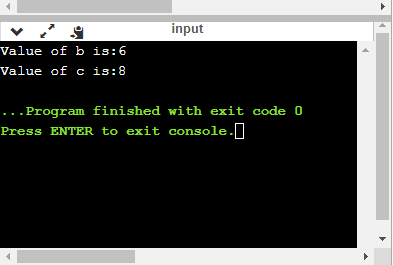
int main()
{
int b=10;
int c= -10;
printf("Value of b is:%u", b);
printf("\nValue of c is:%u",c);
return 0;
}
In the above program, we are displaying the value of b and c by using an unsigned format specifier, i.e., %u. The value of b is positive, so %u specifier prints the exact value of b, but it does not print the value of c as c contains the negative value. Output 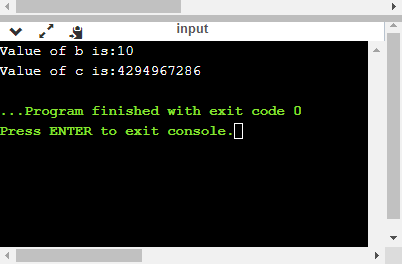
int main()
{
int a=0100;
printf("Octal value of a is: %o", a);
printf("\nInteger value of a is: %d",a);
return 0;
}
In the above code, we are displaying the octal value and integer value of a. Output 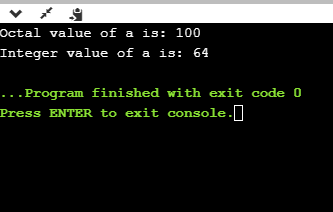
int main()
{
int y=0xA;
printf("Hexadecimal value of y is: %x", y);
printf("\nHexadecimal value of y is: %X",y);
printf("\nInteger value of y is: %d",y);
return 0;
}
In the above code, y contains the hexadecimal value 'A'. We display the hexadecimal value of y in two formats. We use %x and %X to print the hexadecimal value where %x displays the value in small letters, i.e., 'a' and %X displays the value in a capital letter, i.e., 'A'. Output 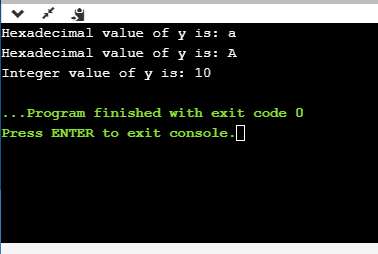
int main()
{
float y=3.4;
printf("Floating point value of y is: %f", y);
return 0;
}
The above code prints the floating value of y. Output 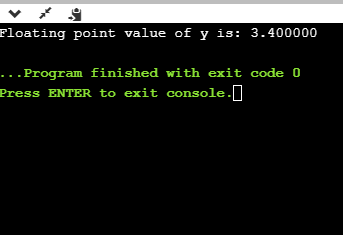
int main()
{
float y=3;
printf("Exponential value of y is: %e", y);
return 0;
}
Output 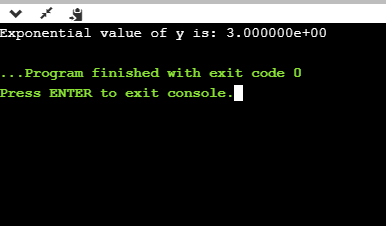
int main()
{
float y=3;
printf("Exponential value of y is: %E", y);
return 0;
}
Output 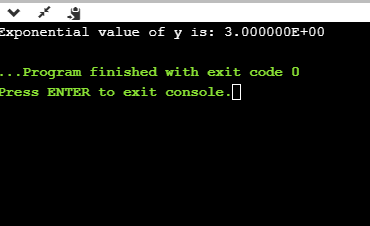
int main()
{
float y=3.8;
printf("Float value of y is: %g", y);
return 0;
}
In the above code, we are displaying the floating value of y by using %g specifier. The %g specifier displays the output same as the input with a same precision. Output 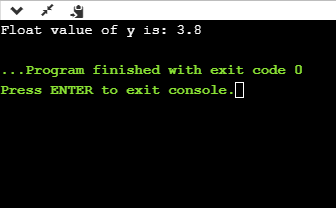
int main()
{
int y=5;
printf("Address value of y in hexadecimal form is: %p", &y);
return 0;
}
Output 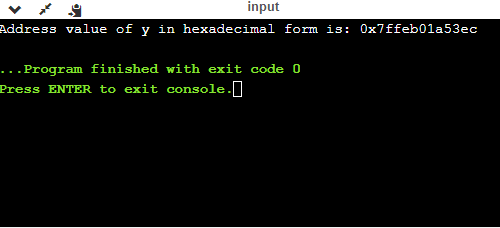
int main()
{
char a='c';
printf("Value of a is: %c", a);
return 0;
}
Output 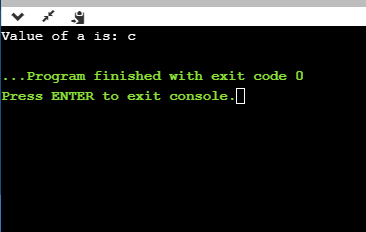
int main()
{
printf("%s", "javaTpoint");
return 0;
}
Output 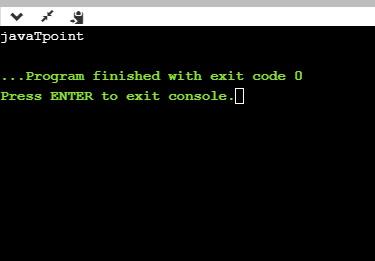
Minimum Field Width Specifier
Suppose we want to display an output that occupies a minimum number of spaces on the screen. You can achieve this by displaying an integer number after the percent sign of the format specifier.
int main()
{
int x=900;
printf("%8d", x);
printf("\n%-8d",x);
return 0;
}
In the above program, %8d specifier displays the value after 8 spaces while %-8d specifier will make a value left-aligned. Output 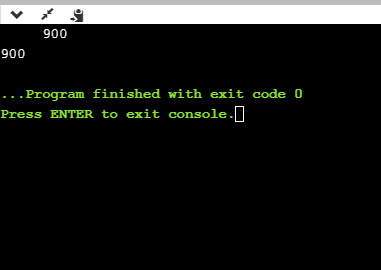
Now we will see how to fill the empty spaces. It is shown in the below code:
int main()
{
int x=12;
printf("%08d", x);
return 0;
}
In the above program, %08d means that the empty space is filled with zeroes. Output 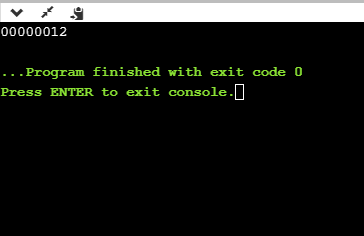
Specifying Precision
We can specify the precision by using '.' (Dot) operator which is followed by integer and format specifier.
int main()
{
float x=12.2;
printf("%.2f", x);
return 0;
}
Output 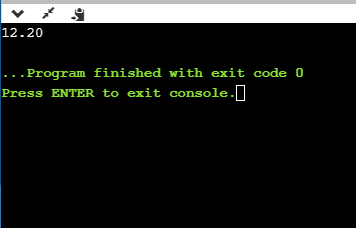
Next TopicC Escape Sequence
|
Related Links:
- C# this
- C# static
- C# static class
- C# static constructor
- C# Main Thread
- C# Thread Sleep
- C# Structs
- C# Enum
- C# Properties
- C# Aggregation
- C# Member Overloading
- C# Method Overriding
- C# Base
- Learn C Programming Language Tutorial
- C# Polymorphism
- C# Sealed
- C# Abstract
- C# Interface
- C# Access Modifiers
- C# Namespaces
- C# Encapsulation
- C# Strings
- C# Exception Handling
- C# try-catch
- C# finally
- C# User Defined Exceptions
- C# Checked and Unchecked
- C# SystemException
- C# FileStream
- C# StreamWriter
- C# StreamReader
- C# TextWriter
- C# TextReader
- C# BinaryWriter
- C# FileInfo
- C# DirectoryInfo
- C# BinaryReader
- C# StringWriter
- C# StringReader
- C# Serialization
- C# Deserialization
- C# System.IO Namespace
- C# Collections
- C# List
- C# HashSet
- C# SortedSet
- C# Stack
- C# Queue
- C# LinkedList
- C# Dictionary
- C# Inheritance
- C# SortedDictionary
- C# SortedList
- C# Generics
- C# Delegates
- C# Reflection
- C# Anonymous Function
- C# Multithreading
- C# Thread Life Cycle
- C# Thread Class
- C# Threading Example
- C# Thread Abort
- C# ThreadPriority
- C# Thread Synchronization | C# Lock
- C Identifiers
- C Switch Statement
- C break statement
- C Array
- C Operators
- C Format Specifier
- C Pointers
- C Pointer to Pointer
- C if else statement
- C Programming Interview Questions (2021)
- C Loop
- C# Jagged Arrays
- C continue statement
- C goto statement
- C String Functions
- C strlen() function
- C strcpy() function
- C strcat() function
- C Union
- C vs C++
- Top 26 C# Interview Questions (2021)
- C strcmp() function
- C strrev() function
- C strlwr() function
- C strupr() function
- C strstr() function
- C Math Functions
- C# Thread Join
- C# Thread Name
- C Preprocessor
- C Macros
- C #include
- C #define
- C #undef
- C #ifdef
- C #ifndef
- C #if
- C #else
- C #error
- Learn C# Tutorial
- C #pragma
- C Expressions
- C Data Segments
- C Programs
- C# if else
- C# Do While Loop
- C Program to reverse number
- C Program to swap two numbers without using third variable
- C Program to print hello without semicolon
- C Program without main()
- C Program to print Alphabet Triangle
- C# Example
- C Program to convert Decimal to Binary
- C Program to convert Number in Characters
- C Strings
- C gets() and puts()
- C Program to print Number Triangle
- C Program to generate Fibonacci Triangle
- C# switch
- C# For Loop
- C# While Loop
- C# Break Statement
- C# Continue Statement
- C# Array to Function
- C# Multidimensional Array
- C# Goto Statement
- C# Comments
- C# Function
- C# Call By Value
- C# Call By Reference
- C# Out Parameter
- C# Arrays
- C# Params
- C# Array Class
- C# Command Line Arguments
- C# Object and Class
- C# Constructor
- C# Destructor

